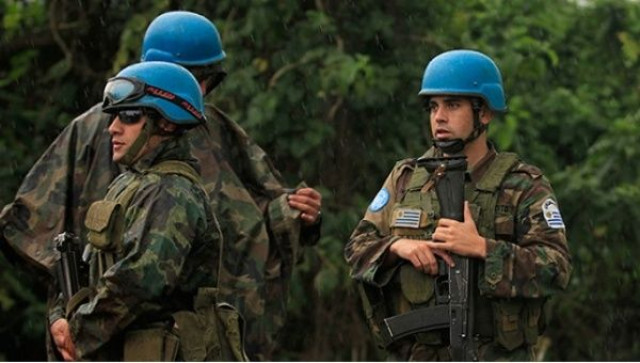Here’s how we can meet peacekeeping challenges
For hundreds of millions, it’s the last best hope. It needs all our support

File photo of UN Peacekeeping soldiers. PHOTO: REUTERS
UN peacekeeping faces increasingly difficult challenges, including attacks against our peacekeepers, complex mandates and uneven political support. Peacekeeping is essentially a collective endeavour: a partnership.
It only works if all partners step up and carry their share, including the Security Council, troop and police contributors, the UN Secretariat, regional organisations and host countries. We require strong, collective action if we are to succeed in addressing these challenges.
This is why the Secretary General launched the Action for Peacekeeping (A4P) initiative on March 28 to reinforce these commitments and help us succeed on the ground where it matters the most.
Following intensive consultations with all member states as well as intergovernmental organisations, the Secretary General put forward a document of shared commitments to all member states for their endorsement.
This Declaration lays out a number of mutual commitments that aims at concretely improving the impact and effectiveness of our operations: stronger support for political efforts, stronger commitment to improve training, equipment and performance and stronger partnerships.
For our part, we have already begun implementing a number of actions. This includes improving performance, mindsets and support for our peacekeepers by implementing our Action Plan on safety and security of UN peacekeepers.
Much work remains to be done, but we are already seeing the effects of our collective efforts.
Seventeen peacekeepers have lost their life due to acts of violence so far this year, compared to 26 in the same period last year. While this represents a significant decrease, we must remain vigilant against continuing threats. Each and every peacekeeper killed is one too many.
In many of our missions, peacekeepers are responding more effectively to threats and attacks.
I recently returned from Mali and I saw firsthand the positive changes MINUSMA has made. Many of our camps are better protected thanks to the use of more advanced systems that detect threats. Our peacekeepers in places such as Aguelhok and Tessalit are conducting more patrols to protect populations despite significant threats. Changing mindsets and enhancing the preparedness of troops is helping to significantly limit casualties during attacks, such as against our base in Timbuktu last April, when the perpetrators were met with a strong response.
We have also undertaken a series of independently-led reviews of peacekeeping missions to assess mandates and determine whether we have the appropriate strategies and resources to meet our objectives.
We are strengthening cooperation with key partners, especially the African Union and the European Union. Despite our full commitment towards implementing these initiatives, UN peacekeeping cannot succeed without the engagement of all our partners.
Strengthening peacekeeping also means helping countries which provide us with troops and police, including by supporting training needs to ensure we deploy personnel equipped and prepared to accomplish these tasks.
Similarly, member states are also key to our efforts to increase the number of women in peacekeeping at all levels. More women in peacekeeping mean more effective peacekeeping. Women are only 21% of our personnel and we must collectively do better.
Ensuring that all United Nations personnel maintain the highest standards of conduct must be at the heart of our collective efforts. In recent years, we have done more to strengthen accountability and transparency, raise awareness and provide better support for victims. However, we must continue to work harder and closely with member states which possess the authority to hold all categories of personnel accountable for criminal conduct.
We are fully committed to playing our part to strengthen peacekeeping. The Declaration of Shared Commitments that more than 135 countries have already signed (and remains open for more endorsements) is an important and meaningful first step. But we now collectively need to implement on the ground where it matters most and where people are counting on us the most.
Peacekeeping deploys to some of the most complex and difficult places, protecting the most vulnerable. For hundreds of millions, it’s the last best hope. It needs all our support.
Published in The Express Tribune, September 25th, 2018.
Like Opinion & Editorial on Facebook, follow @ETOpEd on Twitter to receive all updates on all our daily pieces.















COMMENTS
Comments are moderated and generally will be posted if they are on-topic and not abusive.
For more information, please see our Comments FAQ